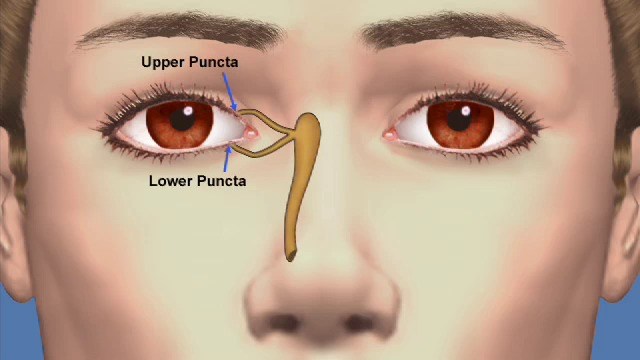If you have too much eye mucus in your eyes in the morning or during the day, this can be due to an eye infection, dry eye syndrome, a sty in your eye, or blocked tear duct. Depending on the severity of your condition, you may just have little crusty specks that stick to the corner of your eye or the eye discharge could be so much that your eyelids stick together.
In this article, we will look at the reasons why eye mucus can build up and cause irritation and discomfort in your eyes. You will also find out how to treat the underlying causes of having too much eye discharge and how to get rid of the pesky eye boogers naturally.
What is Eye Mucus?
Glands produce mucus to protect the delicate surface of your eyes, mouth, and nose from dirt and grime.

The journal Experimental Eye Research says that the mucous layer of the cornea and conjunctiva protect the eye from germs and grime sticking to the eyeball. It also helps to hydrate the eye and prevent dry-eye problems. When you blink, a thin layer of mucus is also present in the tear fluid that helps to hydrate the eye and remove any foreign object on the surface of the eye.1
Doctors have found that certain health conditions that affect the eye can cause either too much eye mucus to be discharged or not enough.
Because eye mucus is similar to the mucus that is discharged from the nose, many people refer to a buildup of eye mucus as eye boogers.
Symptoms of Eye Boogers and Eye Mucus
Discharge from the eyes is usually clear and watery. According to Dr. William Blahd on WebMD, small amounts of mucus-like discharge that is white or yellow is common in the morning.2
Because colds and the flu cause the body to discharge extra mucus, you may also have classic upper respiratory infection symptoms like a runny nose, sneezing, and a fever.
Causes of Mucus in the Eye
Let’s look at the common causes of an abnormal amount of mucus in the eye. Very often, you can get rid of the eye boogers easily with some of the home treatments that are mentioned at the end of the article.
Pink eye (conjunctivitis)
Mucus in your eye in the morning could be caused by pink eye, which is also called conjunctivitis. The term pink eye is given because along with the eye mucus, the inner eyelid and white of the eye will be red and inflamed.
According to Dr. Alan Kozarsky on WebMD, pink eye causes thick mucus in the eye after sleep, a burning sensation in the eye, and possibly blurred vision due to the excess mucus on the surface of the eye.3There are various types of eye inflammation that cause a thick discharge to appear in the eye and become crusty.
Viral conjunctivitis. The common cold virus can cause viral pink eye that is very contagious. The symptoms of viral conjunctivitis can range from mild to severe.
According to Dr. Mary Lowth on Patient.info, viral conjunctivitis usually starts in one eye before spreading to the other eye. This causes a watery, sticky mucus discharge that is crusty in the morning. You should always wash your hands after touching an infected eye to prevent the infection spreading to your other eye or other people.4
Bacterial conjunctivitis. Children and infants often get bacterial conjunctivitis that causes yellowish-white mucus in the eye. However, bacterial pink eye can affect people of all ages.
Dr. Mary Lowth says that a bacterial pink eye infection often causes the eyelids to stick shut even during the day time. The eye mucus will be thicker and stickier rather than the watery discharge that viral conjunctivitis causes. This type of bacterial pink eye is also infectious and you should wash your hand before and after touching your affected eye.

Allergic conjunctivitis. If the eye mucus is watery and thin and you have a gritty sensation in your eye, then you could suffer from allergic conjunctivitis.
Eye infection
Apart from eye infections that cause pink eye, there are other types of eye infections that can increase mucus and eye gunk. Dr. Kathleen Romito on WebMD says that irritation or a minor eye injury can cause an eye infection that produces white or creamy eye mucus. Also, the herpes zoster virus (shingles) can cause symptoms of an eye infection and cause you to wake up with sleep in your eyes.
Eye stye
An eye stye (eye sty or external hordeolum) can cause a bump on your eyelids that results in pus forming in the rim of your eye. Eye styes are caused by bacteria infecting a blocked eyelash follicle on the eyelid. It can be a very painful experience as the bump fills with pus, becomes inflamed and red.
Dry eyes
You may notice eye boogers when you get up in the morning if you suffer from dry eyes. Usually, every time you blink, a layer of tear fluid lubricates your eyes and prevents irritation. When your glands don’t produce enough tear film (mucin deficiency), the health of your eye can suffer.
Dry eyes may be another reason why your eye twitches involuntarily.
Blocked tear ducts
Thin watery mucus draining from the corner of your eye or thick eye mucus caused by an infection could be due to a blocked tear duct. You may experience a blockage of the tear duct after a cold or sinus infection.
The tear duct blockage can also result in mucus crusting on your eyelashes.

Use of contact lenses
Many people who use contact lenses suffer from excess mucus forming in their eyes as they sleep. Dr. Brian Wachler on WebMD says that wearing contact lenses increases your risk of developing keratitis, eye infections, or pink eye.
Dr. Wachler recommends stopping wearing contact lenses for a time if they cause gooey mucus to form in your eyes that sticks to your eyelids. Along with the eye discharge, irritation from contact lenses can cause redness and swelling on your eyelids or constant itching in your eye. Usually, a doctor or ophthalmologist will diagnose the cause of the eye irritation.
To prevent eye infections if you wear contact lenses, you should do the following:
- Keep your lenses clean and always follow the instructions on the cleaning solution label.
- Wash your hand before changing your contacts.
- Don’t sleep with your contacts as this could cause eye boogers in the morning.
- Remove contacts before showering, bathing, or swimming.




